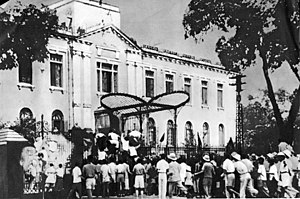The August Revolution (Vietnamese: Cách-mạng tháng Tám), also known as the August General Uprising (Vietnamese: Tổng khởi-nghĩa giành chính-quyền tháng Tám, lit. 'the Total uprising to seize power in August'), was a nationalist and republican revolution led by the Việt Minh against the Nguyễn-led Empire of Vietnam from 16 August to 2 September 1945. The Empire of Vietnam was a Japan's puppet state within the Greater East Asia Co-Prosperity Sphere. The Việt Minh, led by the Indochinese Communist Party, was created in 1941 and designed to appeal to a wider population than what the communists could command.
Within two weeks, forces under the Việt Minh had seized control of most rural villages and cities throughout Northern, Central and Southern Vietnam, including Huế (then the capital of Vietnam), Hanoi and Saigon. The Nguyễn dynasty with its puppet government of Trần Trọng Kim collapsed and its emperor Bảo Đại abdicated on 25 August 1945. The August Revolution sought to create a unified regime for the entire country under the Việt Minh's rule. Việt Minh leader Hồ Chí Minh declared the independence of the Democratic Republic of Vietnam from France to replace the old Nguyễn dynasty on 2 September 1945 with his quote “all men are created equal. They are endowed by their Creator with certain inalienable rights."
- ^ Political parties conflicts in Democratic Republic of Vietnam (North Vietnam)
- ^ "Vo Nguyen Giap | Biography & Vietnam War | Britannica". www.britannica.com. Retrieved 30 July 2023.
